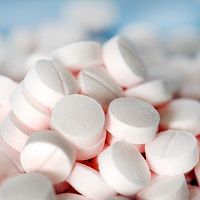Article
The Importance of Identifying an Actual Aspirin Allergy
Author(s):
Patients who could benefit from aspirin may be (wrongly) told that they are allergic because they had a reaction to the drug.

Patients who could benefit from aspirin may be (wrongly) told that they are allergic because they had a reaction to the drug.
In a study that will be presented at the 2015 American College of Allergy, Asthma, and Immunology Annual Scientific Meeting (ACAAI 2015) in San Antonio, Texas, the authors looked at the medical records of 5,052 participants. Only 131 of them (2.5%) had aspirin hypersensitivity, however, 34% were mistakenly marked as having the intolerance just because of past gastrointestinal symptoms (GI). While hypersensitivity causes an exaggerated immune response, it’s different than an actual diagnosed allergy.
“Our study showed none of the patients that were determined to have aspirin hypersensitivity were referred to an allergist for testing to determine if they had a true allergy,” lead author Gabriela Orgeron, MD, said in a news release. “In addition, we found that patients with GI symptoms were mislabeled as having aspirin allergy, which likely deprived them of being treated with aspirin in the future.”
The findings showed that most common allergic responses were skin reactions (19%). One patient had anaphylaxis, or a severe allergic reaction, and another experienced respiratory symptoms. However, there was not proper records explaining the type of reaction in 39% of the records.
“In cases such as those shown in the study, patients are frequently told to discontinue aspirin therapy or are switched to another medication when there is no reason to do so,” one of the authors Sudhir Sekhsaria, MD, pointed out.
Allergists play an important role in determining actual allergies and the proper evaluation can lead to better management of serious conditions.





